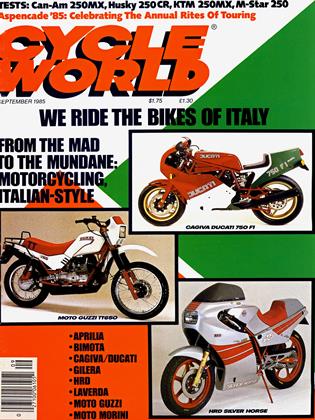SERVICE
Blubbering open-classer
I bought a new leftover 1983 Kawasaki KX500 motocrosser at an unbeatable price, to use for play riding. I read your test of the bike before I bought it, so I knew of its shortcomings.
Here is my problem. As mentioned in your article, I made sure my KX had the optional jetting kit installed to prevent detonation. But the engine seems to be running excessively rich. At ¾ to full throttle it pulls hard, but off idle to ¾ it burbles and doesn’t pull very well. My past experience with two-strokes says that the problem lies in the needle/needle-jet area, but after reading about the detonation problem and the fact the cylinder can't be rebored, I’m scared to lean it out without some guidance.
For your info, I am running
AMOCO unleaded gas, Yamalube-R at 20:1, the Kawasaki recommended optional jetting, and the Kawasaki recommended retarded timing. I would appreciate any help you could give me. Except for the midrange, the KX is a fine playbike.
David L. Hamblin
Batavia, Ohio
The 1983 KX500 is a great motorcycle as long as you live near a military airport that still has P51 Mustangs fl ying, along with a suppl y of purple (120 octane) avgas. The KX has too high of a compression ratio, along with a combustion-chamber shape that tends to cause detonation. Klemm Research (2701 E. Regal Park > Dr.. Anaheim. California 42806;
[714] 630-4420) has had good results reshaping 1483 KX heads to increase detonation resistance. For a plavbike, we'd recommend one of K/emm's reshaped e vlinder heads along with a further drop in compression. That could be accomplished by installing two cylinder-base gaskets.
With more detonation resistance, you could dial-in the carburetion to give a mixture the engine actualiv likes, rather than one that corrects for a design defect. And by the way, you might try another oik such as 'Bel-Ray MC-1 oil, that uses a higher mixture ratio instead of the 20-to-1 Yamalube; while Yamalube is a very good twostroke oil. the combination of it and any given gasoline results in a lower octane rating than with 40-to-l or 50(o-l oils.
Turbo oil
I own a 1982 Yamaha 650 Turbo and want to know what motor oil is right for it. Naturally, my dealer recommends Yamalube 20w40. But in the past I've had good luck with Valvoline 20w50 racing oil in nonturbocharged motorcycles. And Quaker State just introduced an oil for turbocharged engines that is supposed to withstand turbo temperatures. This oil also is supposed to have slightly higher detergent to compensate for turbo contamination.
While my bike has been on warranty. I’ve been using Yamalube 20w40. but because the warranty is about to expire. I'm thinking about switching oils. W'hat would be best?
Loren Hiltner
Pingree. North Dakota
Yamaha doesn't insist on Yamalube oil to keep the warranty in effect; all the company asks is that you use 20w40 SE-rated oil in warm weather. And with normal oil-change intervals, any oil with that viscosity (or 20w50, for that matter) rated either ST or ST would be entirely adequate.
As for what would be best, there might be some merit in Quaker State's Turbo oil. The environment the turbocharger's bearings have to live in is considerably hotter and harsher than that of any engine bearings, and is at its worst when the bike is parked immediate!y after a hard run. Then the turbine-side easing of the turbocharger can be so hot as to glow red. > 14'hile the motorcvc/e sits, w ithout air flow through the compressor or oil flowthrough the bearings to keep temperatures down, this heat spreads through the turbocharger, sometimes cooking the oil that remains in the turbo bearings. That's the specific condition the Quaker State oil is designed to cope with, so it seems reasonable that as long as it carries the right viscosit r and SAE qualit y grade recommendation for the Yamaha, it would he a good choice.
Malossi (MALOSSI!?) carburetors
1 bought a set of Dell'Orto 36mm carburetors from a friend. The box and some decals in it said CDC Malossi Racing carburetors. They look like Mikuni smoothbores. My friend (who had a bike shop several years ago) can't remember where he got them. I need jets and tuning information; can you help?
Leo Flynn
Richmond. Virginia
li e understand that Malossi carburetors are essentially hot-rodded Deli'Ortos: Dell'Orto castings are used along with different machining for greater air flow. But Malossis are so rare that we're not sure of all the differences between them and their more common ancestors.
We'd suggest you contact Ron Wood, the reigning expert on. and distributor of, Dell'Orto curbs. He should be invaluable in helping you set up the Malossis. and in figuring out which Dell'Orto parts will interchange. He can be reached at Ron W ood Racing. 755 W . 17th Sr.. Costa Mesa. CA 92627; (714) 645-0292. 0
 View Full Issue
View Full Issue
More From This Issue
-
 Departments
DepartmentsEditorial
September 1985 By Paul Dean -
 Departments
DepartmentsAt Large
September 1985 By Steven L. Thompson -
 Letters
LettersLetters
September 1985 -
 Roundup
RoundupAikido: Pre-Accident Preparation
September 1985 By Camron E. Bussard -
 Roundup
RoundupLetter From Japan
September 1985 By Koichi Hirose -
 Roundup
RoundupLetter From Europe
September 1985 By Alan Cathcart






